If you’re considering buying a new water heater or wondering if your current one is worth repairing, you’ve probably arrived at this question: how long do water heaters last?
In this article, you’ll read about your heater’s longevity, how to improve it, and what are the early signs of its age.
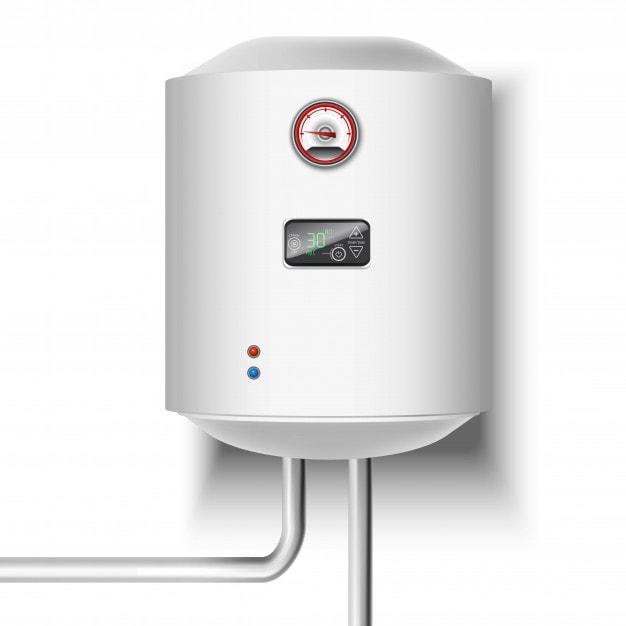
How Long Do Water Heaters Last?
A water heater can last a decade or more when properly maintained. Unfortunately, it’s one of the most overlooked appliances around the house and only remembered when it fails. By then, it might be too late to save it. Maintaining it is simple. Draining it as regularly as once per year can do wonders for its longevity. In this section, you’ll learn more about your heater’s lifespan.
Typically, tank water heaters last between eight and ten years. Tankless heating systems can last up to 20 years if handled with care. If you want your heater to last as long as possible, you should learn how to flush it regularly, as recommended by your manufacturer. If you live in a hard water zone, you may need to flush it more often. Mineral sediments on the bottom of it or along the pipes can cause the whole system to break down early.
Notice that different kinds of water heaters also have varying lifespans. Tank heaters can be gas or electricity-powered. Gas heaters usually last around ten years, but they have more parts that are likely to break or malfunction. Electricity heaters tend to last a little longer—a year or two more.
Still, the longest-lasting water heating system is the tankless water heater. This kind of system can last up to 20 years. Such longevity is explained by the fact that this system isn’t constantly working like the tank ones. Despite being tankless, this system also requires regular maintenance for the best performance.

What Affects the Lifespan of Your Water Heater?
Several variables can impact your water heater’s lifespan. From lack of maintenance to water quality, here are some of the main ones to consider:
Type of Water Heater
Tank and tankless water heaters have different life expectancies. Tanking systems last between eight and twelve years, while tankless ones can last up to 20 years.
Sediment Build-up
Sediment build-up is one of the worst enemies of your water heating system. With time, they create soft spots on the bottom of the tank or along the pipes of your tankless system. Those spots develop into holes that ultimately compromise the entire system.
Water Quality
Water quality and sediment build-up are related issues. If you use hard water or your water comes with too much sand and minerals from the municipal lines, you need to flush your system more often. Consider installing a water softener in this case.
Age
Age is one of the deciding factors in your water heater’s lifespan. Tanking systems of ten years or more are probably heading towards retirement. Tankless systems also call for replacement after approximately 20 years of use. Newer models tend to be more durable and energy-efficient.
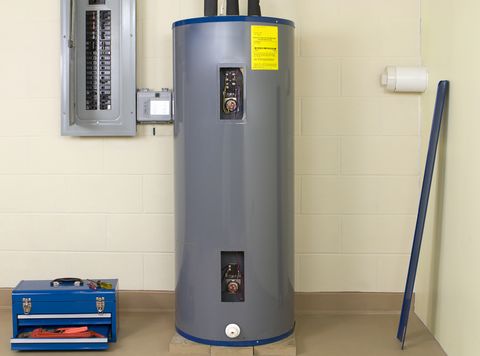
Location of Installation
Where you install your water heater will affect how well it works. Ideally, the unit is positioned in a way to provide fast, hot water to your kitchen and bathrooms. The unit must be installed at least 12 inches from the walls. This spacing will allow the necessary airflow to function correctly.
It’s advisable to install it where it’s not in sight—that’s why it’s usually installed in attics, basements, or closets. If you choose to install it in the attic, consider that, in case your tank bursts, there’s a high risk of damage in the lower levels. Installing it in the basement, if possible, reduces the potential losses.
Maintenance Practices
Maintenance can be the difference between a durable system and a short-lived one. Regular flushing avoids problems related to sediment build-up. This kind of problem can escalate to unrepairable issues, like leaks and rust buildup.
Source of Power
Electric and gas water heaters have slightly different lifespans. It’s because gas heating parts are more likely to malfunction or break. Electric units typically last between ten and twelve years.
Signs of a Bad Water Heater
It doesn’t matter how well you maintain your unit, if you flush it regularly or not, or if you use hard or softened water. Eventually, your water heater will stop. It’s crucial to understand what happens when your system starts to fail so that you can replace it in time.
If you wait for it to stop working before you look for a new one, you may have many unpleasant days at home, with no hot water for bathing, cleaning, or anything else that relies on it.
If you don’t want that, learn the tell-tale signs that your system needs replacement. Here are the main symptoms:
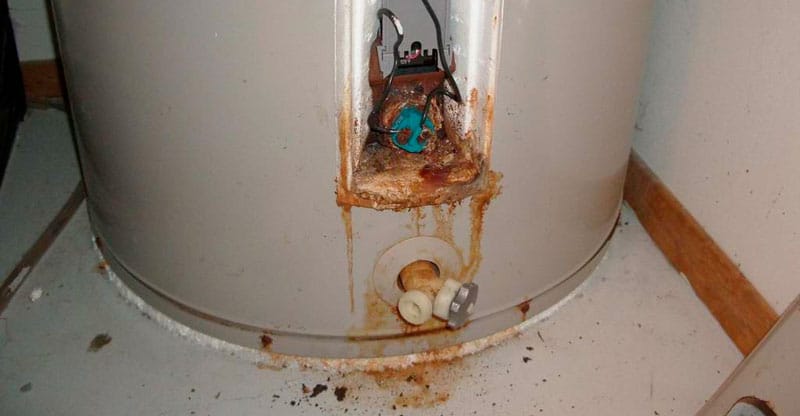
Rust In the Water and On the Tank’s Surface
Rust and sediments from the municipal lines can render your water improper for consumption.
Water Has a Different Color
There are two pressing reasons for planning a replacement before your system collapses: your water quality and your bills. When water gets rusty or cloudy, it’s time to flush it or look for professional support.
Doesn’t Heat like Before
Sediments make the system work harder to heat and keep water at the right temperature. It results in less hot water.
Higher Utility Bills
Old systems tend to use more energy to perform the same tasks, especially when there are leaks. This will lead to more expensive bills. If you’ve noticed a sudden increase in your utility bills, your faulty water heater might be the culprit.
Age
Your system won’t last forever. If your tank system is around ten years old, it’s time to start considering a replacement. Watch for signs of age such as rusty water and less hot water supply.
Unusual Noises
You can observe that there’s sediment accumulated in your system because the tank will make unusual noises while functioning.
Requires Constant Repairs
Of course, you don’t need to replace your system at every early sign of trouble. Many problems are easily repairable. Still, if your plumber needs to visit you too often, it’s time to do the math and check if buying a new system would be worth it.

Replace or Repair, Which is Better?
This forgotten appliance in your basement becomes your top priority when you can’t have hot water on your faucets and shower. When this situation arrives, you must decide whether to fix it or replace it.
Be sure you won’t waste your money trying to fix a system beyond salvation or replacing a system that could still live a few years more. Here are the main reasons for not trying to repair it.
Age
If your tank is ten years old or more, it’s not worth repairing. While parts wear out, your system requires repairs more often. New systems are more economical and longer-lasting. In the end, the money you spend on fixing old heaters can be best used on a new unit.
Leaks
Leaks are usually the death sentence of your tank. Glass-lined tanks can’t be repaired when they crack. Steel tanks can’t plug holes caused by rust. Rust itself is not repairable and damages your water quality badly.
Your appliance can still have a few more years of proper functioning, even if one of the minor inconveniences below happens. For the problems below, solutions might be easy and inexpensive.
- Broken thermostat
- Pilot flame is flickering
- Burned or worn out parts
- Circuit breaker on electric heaters
Pros and Cons of Replacement
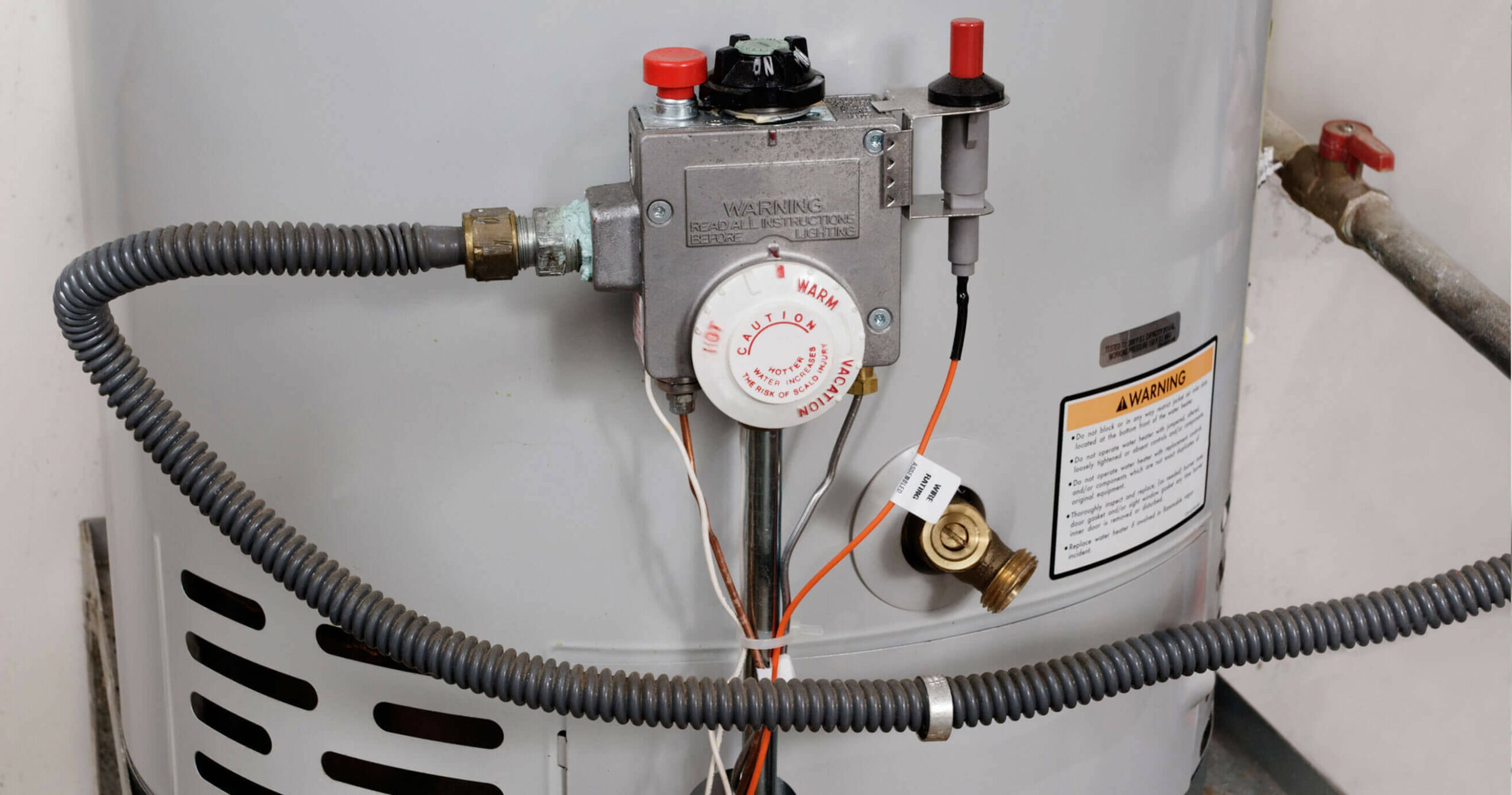
Buying a new system can solve many problems. But is that really the solution you need? Compare the pros and cons below:
Cost-Effective in the Long Run
Newer systems are more capable and more cost-effective than decade-old ones.
If your water heating system is between eight and twelve years old, it’s not only reaching its limit, it’s also not the most efficient appliance around anymore.
As your water heater’s efficiency declines, your utility bills will rise. Replacing your water heater at this point can save you money and a lot of trouble down the road.
Prevents Constant Maintenance
If it’s an old system, buying a new one can be cheaper than fixing it constantly.
Besides, the older it gets, the more likely it’s going to need frequent repairs. Over the years, heating parts are prone to wear out and break, valves can malfunction, and so on.
From a tiny repair to another, you can end up spending the same amount (or more) that it takes to buy a new system.
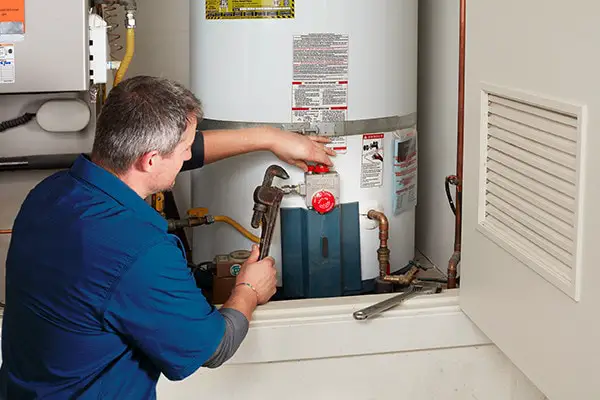
Replacements Are Much More Expensive Than Most Repairs
Replacements cost way more than just changing out a thermostat or fixing a valve. You need to buy a whole new unit and pay for installation. Replacing your unit can cost you a few hundred to a few thousand dollars. It can be a real inconvenience if it gets your budget off-guard. In this case, it might be better to get a quick fix until you can replace your unit.
You May Not Be Using the Best of Your System
Sometimes, it can be wasteful to replace your system at the early signs of trouble. Assess the situation and make sure it’s only a minor issue, such as a small part needing replacement or a valve needing any change.
Such minor fixes can improve your unit’s lifespan, provided they don’t become too frequent. In that case, you may have no other choice than to replace it.
Pros and Cons of Repairing Your Unit
Repairs are usually cheap ways of keeping your unit working satisfactorily for longer. Yet, repairing your unit can become wasteful over time. Consider the points below before repairing your unit.
It’s Much Cheaper than Replacing the Whole System
If you puncture your tire, you won’t buy a new car. The same principle applies here. Replacements can cost you a lot of money and trouble. So, it’s always better to check if your heater’s problem can or can’t be fixed. Don’t panic if you see a puddle around your tank: it may only be only a loose water connection or a valve that needs replacement.
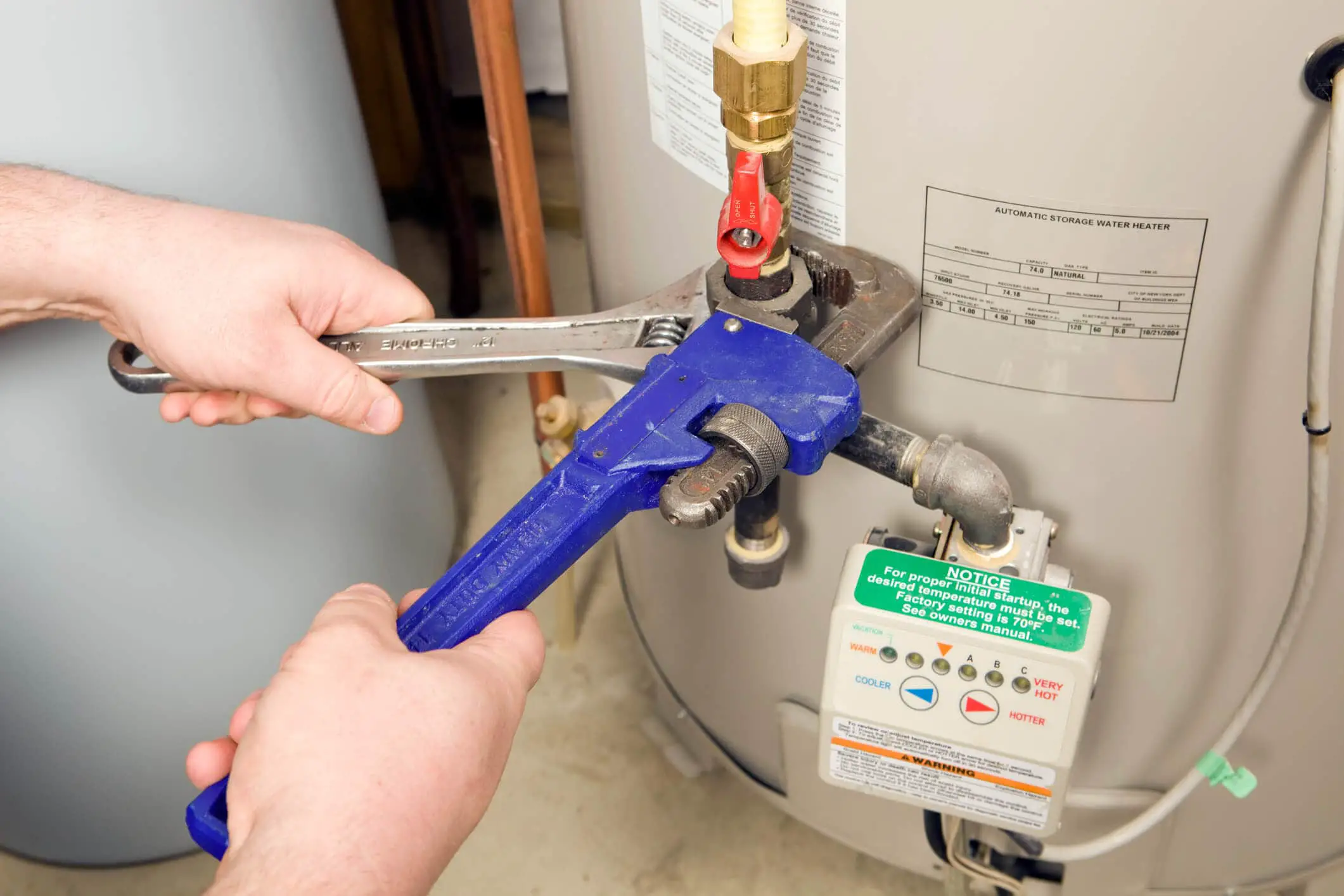
With Minor Fixes, You Can Use Your Unit to Its Best Performance
Replacing small parts due to wear can keep your system working like new for longer. Watch for signs of wear and replace parts as necessary. Typically, it doesn’t make sense to replace your system if it’s younger than eight years and it doesn’t show signs of erosion.
Repairs Won’t Make Your Unit More Efficient than a New Model
Technology evolves fast, and your water heater from a couple of years ago may no longer be the smartest around. Of course, you don’t need to waste a perfectly working unit only because there’s a new one in the market. Still, it would be best to consider more updated options when your old heater starts showing signs of age.
It Can Become Recurrent and Wasteful
Over time, your system’s parts depreciate and need replacement. If your system is already around eight years old or more, it’s likely to present recurrent problems, or more pieces will need replacement. When your expenses with plumbing start to escalate, it’s time to consider getting a new system.
Conclusion
Water heaters have different durability depending on the type of heater, their energy source, and required maintenance. Electric and gas heaters last between eight and twelve years. It’s essential to note that electric systems tend to last longer than gas ones. When it comes to longevity, the tankless system is unbeatable—up to 20 years, with proper maintenance.
People Also Ask
Information is key to saving your money. Don’t leave this page if you still have questions about your water heating system, whether it needs replacement, and what to do. In this section, you’ll read more about common doubts customers have about this issue.
Yes, if we’re talking about a tankless water heater. The tankless system lasts much longer than gas or electric units. Gas systems last between eight and ten years, while electric systems last between ten and twelve years. Tankless systems last so much longer because they’re not constantly on, like the other ones.
Prices can change, depending on what kind of system you’re replacing. Prices vary in different states, so it also depends on where you live. Typically, water heater replacements can cost anything from $812 to $1.569 for replacing a tanking system. A tankless one can cost up to $2.500.
It’s highly advisable to look for a replacement before your system breaks. Leaving replacement for the last minute can cost you days of chaos at home, with no hot water to do essential tasks, like cleaning and showering. Avoid this hassle by acting in advance.
It depends on where and why it’s leaking. Some leaks are easy to solve, like when it’s on the drain valves, pressure valves, or loose connections. Those problems are quick and straightforward to solve. However, when the heater’s leaking due to corrosion on the bottom, it’s time to replace the tank.
Both systems last around the same time: between eight and twelve years. Although, electric water heaters have a slight advantage over gas ones: they have fewer parts that are likely to break. It makes it last a little longer on average than gas systems—up to two years more.
